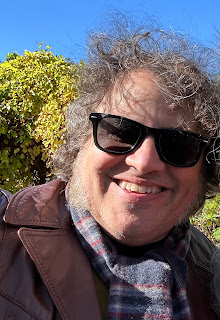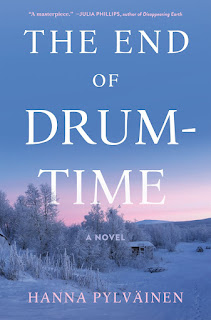Five Minutes with....Daniel Paisner
Daniel Paisner has been a twitter friend of mine for several years. He's a tremendously nice fellow and a great follow on social media. (bio and author photo taken from author's website)

Daniel Paisner is a journalist, author and podcaster, with more than 70 books to his credit, including 17 New York Times best-sellers. He is the “voice” of Serena Williams, Steve Aoki, John Kasich, Whoopi Goldberg, Denzel Washington, Ray Lewis, Ron Darling, Gilbert Gottfried, Anthony Quinn and dozens of other name-above-the-title celebrities. He is the winner of two NAACP Image Awards for his work with Shark Tank panelist and serial entrepreneur Daymond John, and his novel “A Single Happened Thing” was named an Indies Finalist as best book of the year by the editors of Foreword Reviews. He has been profiled in the Wall Street Journal, the New York Times, ESPN: The Magazine and on National Public Radio. New York magazine once called him “the world’s most prolific ghost,” which may or may not have been a compliment. Over the course of his ghostwriting career, Paisner has taken on the real-life personas of dozens of compelling individuals, including a World Series of Poker champion; the son of a Yanomami tribeswoman; a plus-size supermodel; an FBI hostage negotiator; a three-term Democratic Mayor of New York City; a three-term Republican Governor of New York State; a daytime television talk show host; another daytime television talk show host; still another daytime television host; a #1 ranked women's tennis player; a bilateral amputee mountaineer; an Emmy winner; a Grammy winner; an Oscar winner; a Tony winner; an "Apprentice" winner; two First Daughters; two network television weathermen; an unlikely prisoner of Libya’s civil war; a New York City bail bondsman; an undersea explorer; a world champion surfer; a foul-mouthed, misogynist comedian; an urban fashion mogul; a Cosby kid; an Olympic swimmer; an autistic high school student; an NFL Hall of Famer; and on and on.
Paisner hosts the podcast As Told To, which features long-ish, freewheeling-ish interviews with fellow authors about their experiences ghostwriting and collaborating with notable figures. His “darkly funny and painfully true” new novel, “Balloon Dog,” was published by Koehler Books in June 2022 to not-quite-widespread critical acclaim.
- - - - -
After the research is done, do you have a specific process that you follow when doing the actual writing?
With my ghostwriting projects, I try to work in chronological order. When I’m interviewing my subjects, I usually start my in-depth questioning with their origin stories: family history, childhood memories, first discoveries of whatever it was that they would become known for or good at. I find it difficult to write from the “middle out.” I like to know as much as possible about my subjects at each stage in their lives, before heading around the bend into what comes next.
When do you write?
I’ve found that I do my best work in the morning, before I’m greeted by the workaday distractions that invariably find me as the rest of the world starts to wake. Also, when I’m working on a novel, I try to avoid social media and text messages until I’ve completed my work for the day. I find that once I slip into a zone where the words start to flow, it’s very difficult to tap back into that state if I’m called away by some pressing (or, not-so-pressing) outside concern.
Do you have a writing nook or do you write wherever/whenever?
I do have my favorite spots, but they tend to shift depending on what I’m working on, and what else is going on in my house. Some weeks, I get into a groove where I write at the kitchen table, close to the coffee maker. Others, I’ll step outside and do my work on the deck behind my house. Often, I’ll write in my attic office. When I look at my bookshelf, I can recall where I was when I worked on each book. But I like to mix it up.
How many hours a day do you typically write?
Some days, I’ll write for ten hours. Some days, not at all. I’m a fairly expert procrastinator, which means I tend to work best when I’m on a tight deadline. I guess I’ve learned this about myself over the years, so if there’s ever a good reason not to work on a particular day, I’ll grab at it. Those idle days add up, however, and the deadlines on some of these celebrity-driven memoirs I help to write are pretty firm, so I’ll usually wind up cranking to get a first draft done on time.
If you could give your younger self any writing advice, what would it be?
Don’t force it. A lot of writers make it a special point of sitting down of working for a fixed amount of time, or a target word count they mean to hit before they close up shop each day. I’ve found over the years that those are false markers for me. When it flows, it flows. When it doesn’t, it doesn’t. When I was starting out, I didn’t give myself permission to step away from my desk if the work just wasn’t happening for me on a given day, for whatever reason. Lately, I’ve learned to cut myself some slack. There’s always tomorrow.
What does literary success mean to you?
Success to me means being able to extract a living from this thing. Some of my books sell more copies than I could have ever imagined, and some sell so few I wonder if it was even worth the trouble to put them out into the world. But it’s not about any one book, for me. It’s about getting to do this thing I love doing, on my own terms, in my own way. As a novelist, I’ve come to accept that I’ll likely never write a blockbuster book that tops the best-seller list, but if my latest novel sells enough copies and garners enough positive reviews to convince a publisher to take on my next novel… well, that’s a win. And on the ghostwriting front, if the person I’m working with is happy with the book I’m able to present to him/her, that’s a win. Typically, those books succeed or fail based on the size of my subject’s celebrity, or the reach of their social media platforms, so if our book doesn’t land in a big-time way it usually has to do with the place they occupy in the pop culture firmament at the time it was released. But if they’re please and proud of the book we wrote together, and if it’s a book I’d be pleased and proud to present as a kind of calling card or audition piece to help me land my next gig, I count it as a successful project.
Who are your writing heroes?
Norman Mailer. His work was endlessly interesting, and constantly evolving, and maddeningly unpredictable. It’s impossible to recognize the man who wrote “The Naked and the Dead” in the pages of, say, “Tough Guys Don’t Dance.” And his long-form reporting and non-fiction work was thrilling. His Pulitzer Prize-winning “The Executioner’s Song” in many ways was a classic example of the kind of work I do to make my principle living – an unorthodox, unexpected collaboration, filtered through the pen and sensibility of one of our most unique voices in American literature, an abundantly talented writer who somehow managed to pare down his prose and stay out of the way of a story that was compelling enough on its own.
I would like to thank Daniel Paisner for taking the time to answer a few questions about his writing process. I believe much can be learned from successful writers and their writing habits.
Daniel Paisner can be found on post.news at. @danielpaisner
Daniel Paisner's website


















